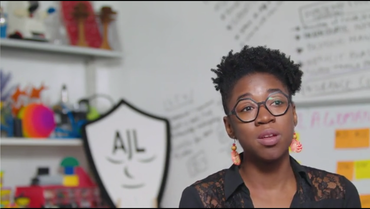Dystopian non-fiction
 How dumb do you have to be to spend decades watching movies and reading books about science fiction dystopias with perfect surveillance and then go on and build one anyway?
How dumb do you have to be to spend decades watching movies and reading books about science fiction dystopias with perfect surveillance and then go on and build one anyway?
*This* dumb, apparently, because that what Shalini Kantayya discovers in her documentary Coded Bias, which premiered at the 2020 Sundance Film Festival. I had missed it until European Digital Rights (EDRi) arranged a streaming this week.
The movie deserves the attention paid to The Social Dilemma. Consider the cast Kantayya has assembled: "math babe" Cathy O'Neil, data journalism professor Meredith Broussard, sociologist Zeynep Tufekci, Big Brother Watch executive director Silkie Carlo, human rights lawyer Ravi Naik, Virginia Eubanks, futurist Amy Webb, and "code poet" Joy Buolamwini, who is the film's main protagonist and provides its storyline, such as it is. This film wastes no time on technology industry mea non-culpas, opting instead to hear from people who together have written a year's worth of reading on how modern AI disassembles people into piles of data.
The movie is framed by Buoalmwini's journey, which begins in her office at MIT. At nine, she saw a presentation on TV from MIT's Media Lab, and, entranced by Cynthia Breazeal's Kismet robot, she instantly decided: she was going to be a robotics engineer and she was going to MIT.
At her eventual arrival, she says, she imagined that coding was detached from the world - until she started building the Aspire Mirror and had to get a facial detection system working. At that point, she discovered that none of the computer vision tracking worked very well...until she put on a white mask. She started examining the datasets used to train the facial algorithms and found that every system she tried showed the same results: top marks for light-skinned men, inferior results for everyone else, especially the "highly melanated".
Teaming up with Deborah Raji, in 2018 Buolamwini published a study (PDF) of racial and gender bias in Amazon's Rekognition system, then being trialed with law enforcement. The company's response leads to a cameo, in which Buolamwini chats with Timnit Gebru about the methods technology companies use to discredit critics. Poignantly, today's viewers know that Gebru, then still at Google was only months away from becoming the target of exactly that behavior, fired over her own critical research on the state of AI.
Buolamwini's work leads Kantayya into an exploration of both algorithmic bias generally, and the uncontrolled spread of facial recognition in particular. For the first, Kantayya surveys scoring in recruitment, mortgage lending, and health care, and visits the history of discrimination in South Africa. Useful background is provided by O'Neil, whose Weapons of Math Destruction is a must-read on opaque scoring, and Broussard, whose Artificial Unintelligence deplores the math-based narrow conception of "intelligence" that began at Dartmouth in 1956, an arrogance she discusses with Kantayya on YouTube.
For the second, a US unit visits Brooklyn's Atlantic Plaza Towers complex, where the facial recognition access control system issues warnings for tiny infractions. A London unit films the Oxford Circus pilot of live facial recognition that led Carlo, with Naik's assistance, to issue a legal challenge in 2018. Here again the known future intervenes: after the pandemic stopped such deployments, BBW ended the challenge and shifted to campaigning for a legislative ban.
Inevitably, HAL appears to remind us of what evil computers look like, along with a red "I'm an algorithm" blob with a British female voice that tries to sound chilling.
But HAL's goals were straightforward: it wanted its humans dead. The motives behind today's algorithms are opaque. Amy Webb, whose book The Big Nine profiles the nine companies - six American, three Chinese - who are driving today's AI, highlights the comparison with China, where the government transparently tells citizens that social credit is always watching and bad behavior will attract penalties for your friends and family as well as for you personally. In the US, by contrast, everyone is being scored all the time by both government and corporations, but no one is remotely transparent about it.
For Buolamwini, the movie ends in triumph. She founds the Algorithmic Justice League and testifies in Congress, where she is quizzed by Alexandria Ocasio-Cortez(D-NY) and Jamie Raskin (D-MD), who looks shocked to learn that Facebook has patented a system for recognizing and scoring individuals in retail stores. Then she watches as facial recognition is banned in San Francisco, Somerville, Massachusetts, and Oakland, and the electronic system is removed from the Brooklyn apartment block - for now.
Earlier, however, Eubanks, author of Automating Inequality, issued a warning that seems prescient now, when the coronavirus has exposed all our inequities and social fractures. When people cite William Gibson's "The future is already here - it's just not evenly distributed", she says, they typically mean that new tools spread from rich to poor. "But what I've found is the absolute reverse, which is that the most punitive, most invasive, most surveillance-focused tools that we have, they go into poor and working communities first." Then they get ported out, if they work, to those of us with higher expectations that we have rights. By then, it may be too late to fight back.
See this movie!
Illustrations: Joy Buolamwini, in Coded Bias.
Wendy M. Grossman is the 2013 winner of the Enigma Award. Her Web site has an extensive archive of her books, articles, and music, and an archive of earlier columns in this series. Stories about the border wars between cyberspace and real life are posted occasionally during the week at the net.wars Pinboard - or follow on Twitter.